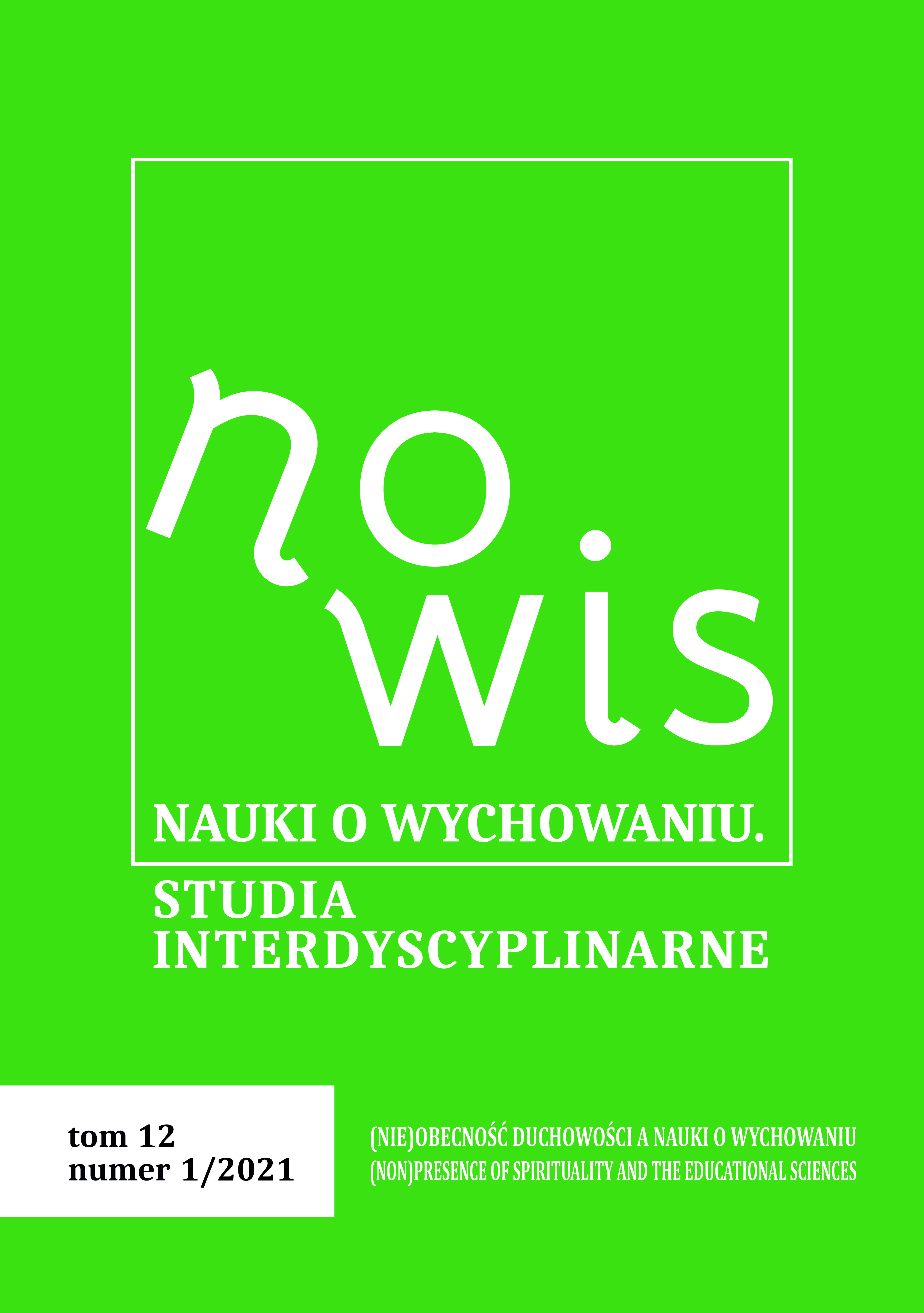Duchowy charakter całości edukacji powodem odradzania się edukacji domowej
DOI:
https://doi.org/10.18778/2450-4491.12.16Słowa kluczowe:
edukacja domowa, duchowość, szkoła publiczna, szkoła prywatnaAbstrakt
Każda odmiana edukacji ma „duchowy” charakter, czego konsekwencją jest renesans edukacji domowej. Kierowana przez rodziców, oparta na rodzinie i domu prywatna edukacja – tj. edukacja domowa – ma tysiące lat, a od czterdziestu lat doświadcza zauważalnego renesansu na całym świecie. Oto jego definicja: „Kierowanie przez rodziców oznacza, że dobrowolnie przyjmują oni na siebie odpowiedzialność za edukację swoich dzieci, kontrolując zarówno jej proces, jak i program (treści). Oparcie na rodzinie to wskazanie, że środkiem ciężkości edukacji jest rodzinny dom, a jej środki mają drugorzędne znaczenie” (homeschoolingbackgrounder.com, 2020). Jednym z głównych powodów upowszechniania się edukacji domowej jest to, że coraz większa liczba rodziców i coraz większy segment opinii publicznej uznaje za istotne wartości, przekonania, a ostatecznie ogólny światopogląd (Weltanschauung). Jako że światopogląd jest ogólną koncepcją lub wizją świata, szczególnie z konkretnego punktu widzenia, to de facto ma charakter duchowy. Artykuł ten wykazuje, że cała edukacja i kształcenie są nauczaniem, wdrażaniem i indoktrynacją dzieci, że światowe odradzanie się edukacji domowej dokonuje się z orientacją na duchowość oraz że empiryczne dowody przesądzają o tym, iż całość edukacji jest duchowa, przy czym duchowość motywuje wielu edukatorów domowych, a wreszcie że akademickie, teoretyczne zaledwie argumenty przeciwko edukacji domowej same zdradzają swoiste uduchowienie.
Bibliografia
Apple, M. W. (2000) The cultural politics of home schooling, “Peabody Journal of Education” 75 (1, 2): 256–271.
Google Scholar
DOI: https://doi.org/10.1080/0161956X.2000.9681944
Barclay, W. (1959) Train up a child: Educational ideals in the ancient world, Philadelphia, PA, The Westminster Press.
Google Scholar
Blumenfeld, S. L. (1984) N.E.A.: Trojan horse in American Education, Boise, ID, The Paradigm Company 284.
Google Scholar
Bolick, C. (1987) The home schooling movement, “The Freeman: Ideas on Liberty”, 37 (3): 84–89.
Google Scholar
Carper, J. C., Hunt, T. C. (2007) The dissenting tradition in American education, New York, NY, Peter Lang Publishing, Inc.
Google Scholar
Farris, M. (2013) Tolerance and liberty: Answering the academic left's challenge to homeschooling freedom, “Peabody Journal of Education”, 88 (3): 393–406.
Google Scholar
DOI: https://doi.org/10.1080/0161956X.2013.798520
Fineman, M. A. (2009) Taking children’s interests seriously in: What is right for children? The competing paradigms of religion and human rights, M. Albertson
Google Scholar
Fineman, K. Worthington (eds.), Burlington, VT, Ashgate Publishing Company: 229–237.
Google Scholar
Glanzer, P. (1998) Religion in public schools: In search of fairness, “Phi Delta Kappan”, 80 (3): 219–222.
Google Scholar
Glenn, Ch. L. (1987) “Molding” citizens in: Democracy and the renewal of public education, R. J. Neuhaus (ed.), Grand Rapids, MI, William B. Eerdmans Publishing Company: 25–56.
Google Scholar
Gunckel, K. L. (2019) Repairing elementary school science, Paper presented at the Annual Meeting of the American Educational Research Association, April 5, 2019, Toronto, Canada.
Google Scholar
Hager, D. (1999, September) The central fallacy of public schooling, “The Freeman”, 49 (9): 20–23.
Google Scholar
DOI: https://doi.org/10.1016/S1090-1027(99)00025-2
Harris, G. (1988) The Christian home school, Brentwood, TN, Wolgemuth and Hyatt, Publishers, Inc.
Google Scholar
Hasson, H. M. R. (2012) The Changing Conversation around Homeschooling: An Argument for More Data and Less Ideology, “University of St. Thomas Journal of Law and Public Policy”, 7, 1 (2012–2013): 1–23.
Google Scholar
Kunzman, R. (2009) Understanding homeschooling: A better approach to regulation, “Theory and Research in Education”, 7 (3): 311–330.
Google Scholar
DOI: https://doi.org/10.1177/1477878509343740
Mayberry, M., Knowles, J. G., Ray, B. D., Marlow, S. (1995) Home schooling: Parents as educators, Newbury Park, CA, Corwin Press (of Sage Publ.).
Google Scholar
Nord, W. A. (1995) Religion and American education: Rethinking a national dilemma, Chapel Hill, NC, The University of North Carolina Press.
Google Scholar
Novak, K. (2016) Abolition: Overcoming the Christian establishment on education, Forest, VA, Deconstructing the Coliseum.
Google Scholar
Pride, M. (1985) The way home: Beyond feminism, back to reality, Westchester, IL, Crossway Books.
Google Scholar
Ray, B. D. (2004) Home educated and now adults: Their community and civic involvement, views about homeschooling, and other traits, Salem, OR, National Home Education Research Institute, www.nheri.org
Google Scholar
Ray, B. D. (2017a) A description and brief history of home schooling in America in: Handbook of School Choice, R. A. Fox, N. K. Buchanan (eds.), Hoboken, NJ, John Wiley and Sons, Inc.: 329–343.
Google Scholar
DOI: https://doi.org/10.1002/9781119082361.ch23
Reich, R. (2002) Testing the boundaries of parental authority over education: The case of homeschooling in: Political and Moral Education, NOMOS XLIII, S. Macedo, Y. Tamir (eds.), New York, New York University Press.
Google Scholar
Rushdoony, R. J. (1982) Larceny in the heart: The economics of Satan and the inflationary state [first published under the title The Roots of Inflation], Vallecito, CA: Ross House Books.
Google Scholar
Stevens, M. L. (2001) Kingdom of children: Culture and controversy in the homeschooling movement, Princeton, NJ: Princeton University Press.
Google Scholar
Van Galen, Jane A. (1987) Explaining home education: Parents’ accounts of their decisions to teach their own children, “The Urban Review”, 19 (3); 161–77.
Google Scholar
DOI: https://doi.org/10.1007/BF01111877
Wayne, I. (2017) Education: Does God have an opinion?, Green Forest, AR: Master Books.
Google Scholar
Wheeler, R. “Little Bear” (1997) Warning: Public schools aren’t for Christians: A Biblical Perspective on the Dangers of Public Schools, Published by and available from Mantle Ministries, 28 Still Ridge, Bulverde TX 78163.
Google Scholar
Bartholet, E. (2020) Homeschooling: Parent rights absolutism vs. child rights to education and protection, “Arizona Law Review”, 62 (1), https://arizonalawreview.org/homeschooling-parent-rights-absolutism-vs-child-rights-to-education-protection/ [date accessed: 30.04.2020].
Google Scholar
DOI: https://doi.org/10.2139/ssrn.3391331
Clark, G. H. (May-June 2009) (1955, August 17, delivered as a public address). The Reformed Faith and the Westminster Confession, “The Trinity Review”, http://trinityfoundation.org/journal.php?id=263 [date accessed: 26.06.2020].
Google Scholar
CLASS Homeschools (2020), https://www.homeschools.org/godly-education [date accessed: 30.09.2020].
Google Scholar
DeAngelis, C. A. (2020) Elites go to war on homeschooling – just when everyone’s doing it, https://www.cato.org/publications/commentary/elites-go-war-homeschooling-just-when-everyones-doing-it [date accessed: 30.09.2020].
Google Scholar
Gates, F. T. (1916) The country school of to-morrow, https://archive.org/details/countryschoolof00gate/page/n1/mode/2up [date accessed: 7.04.2020].
Google Scholar
Homeschoolingbackgrounder.com. (2020), https://homeschoolingbackgrounder.com/ [date accessed: 29.09.2020].
Google Scholar
Lionini, P. (1980) (first printing 1980; copyright 1993) The Leipzig connection: The systematic destruction of American education, Sheridan, Oregon: Heron Books, https://archive.org/stream/LionniTheLeipzigConnectionSystematicDestructionOfAmericanEducation1993/Lionni%20-%20The%20Leipzig%20Connection%20-%20Systematic%20Destruction%20of%20American%20Education%20%281993%29_djvu.txt [date accessed: 7.04.2020].
Google Scholar
London Baptist Confession (1689), https://www.arbca.com/1689-confession date accessed: 30.09.2020].
Google Scholar
Princeton University Press (2001), http://pup.princeton.edu/titles/7135.html [date accessed: 6.09.2001].
Google Scholar
Ray, B. D. (2017b) A review of research on Homeschooling and what might educators learn?, “Pro-Posições”, 28 (2), http://dx.doi.org/10.1590/1980-6248-2016-0009 [date accessed: 11.06.2020, 21.11.2018].
Google Scholar
DOI: https://doi.org/10.1590/1980-6248-2016-0009
Ray, B. D. (2017c) A systematic review of the empirical research on selected aspects of homeschooling as a school choice, “Journal of School Choice: International Research and Reform”, 11 (4): 604–621 https://doi.org/10.1080/15582159.2017.1395638 [date accessed: 12.12.2017].
Google Scholar
DOI: https://doi.org/10.1080/15582159.2017.1395638
Rothbard, M. N. (1999; originally published 1971 in magazine “The Individualist”) Education: Free and compulsory. Auburn, AL: Ludwig von Mises Institute; http://mises.org/library/education-free-and-compulsory-1 [date accessed: 8.01.2015].
Google Scholar
The Old Schoolhouse (2020), www.theoldschoolhouse.com date accessed: 30.09.2020].
Google Scholar
United States Department of Education (2019, December) Homeschooling in the United States: Results from the 2012 and 2016 Parent and Family Involvement Survey (PFI-NHES: 2012 and 2016), https://nces.ed.gov/pubs2020/2020001.pdf [date accessed: 30.09.2020].
Google Scholar
Pobrania
Opublikowane
Jak cytować
Numer
Dział
Licencja

Utwór dostępny jest na licencji Creative Commons Uznanie autorstwa – Użycie niekomercyjne – Bez utworów zależnych 4.0 Międzynarodowe.





 Strona czasopisma, prowadzona przez Zespół redakcyjny NOWiS na platformie Index Copernicus:
Strona czasopisma, prowadzona przez Zespół redakcyjny NOWiS na platformie Index Copernicus: 





